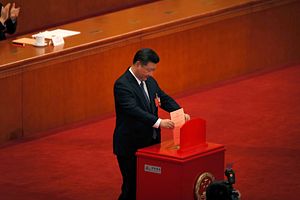The Chinese National People’s Congress’ rubber-stamp vote to officially amend the Constitution of the People’s Republic of China to remove term limits for the presidency should not come as a shock to anyone. Dissenters, China watchers, government officials, and international businesses had months to prepare for a potential “paramount leader for life” Xi Jinping. Despite some claims that “[t]his is history going backwards” — which is true compared to very recent history — one-man rule for an indefinite period of time is very much in line with China’s political culture and should be expected in Chinese politics.
In 2016, The New York Times reported that Xi may attempt to stay on as paramount leader (president of China, chairman of both the Central Military Commission of the Communist Party of China and the Central Military Commission of China, and general secretary of the Communist Party of China) for a third term and delay anointing a successor during the 19th National Party Congress in October 2017. Lo and behold, no successor emerged from the Politburo Standing Committee reshuffle, which has typically indicated a paramount leader’s successor. These two factors, along with Xi’s proposal to amend China’s constitution at a Politburo meeting on September 29, 2017, laid the foundation for a return to a more traditional form of Chinese politics.
Throughout Chinese history, one-man rule has, unsurprisingly, been the norm. From the Shi Huangdi (First Emperor) of the Qin dynasty to Grand Empress Dowager Cixi of the Qing dynasty, Sons (or, in rare cases, Daughters) of Heaven would theoretically wield absolute power, through constrained by tradition, scheming family members, and scholar-officials. After the abdication of Puyi and the fall of the Qing, the Republic of China was just as despotic. Yuan Shikai, who attempted to restore the old order and declared himself emperor, and other Beiyang Government leaders, which included an attempted Qing restoration, were just as prone to strong man leadership as eventual President Chiang Kai-shek, who like Mao Zedong died as leader. Xi Jinping is simply another emperor in a long line spanning over 2,000 years.
In contrast, “collective leadership” in China was more of an anomaly – and a recent one at that. Deng Xiaoping, the third paramount leader of the People’s Republic, purportedly invented collective leadership to avoid the chaos that resulted from Mao’s death, in addition to the perils of one-man rule. But did Deng and his successors actually practice it, thereby leaving a model that could be used?
If one looks at Deng and his successors, one will find collective leadership to be lacking. According to Zhao Ziyang, the tragic general secretary and premier who died under house arrest after the Tiananmen Square massacre, Deng wanted to concentrate power for the sake of efficiency. Not to mention, Deng’s role in authorizing Chinese security services to use force against the Tiananmen Square protesters displayed his affinity for one-man rule. Furthermore, Deng’s Southern Tour in 1992, which emulated the tours of past Sons of Heaven like Kangxi, spurred the Communist Party to continue down the road of “reform and opening up” – no collective leadership necessary. Deng’s paramount leadership ended upon his death despite officially retiring in 1989.
What about Deng’s successor, Jiang Zemin? While a compromise candidate, Jiang followed his predecessors’ examples when it came to leadership, albeit with modifications. Like Deng and Mao, Jiang was named “core” of the Party and had his theory, the “Three Represents,” enshrined in China’s constitution. When it came to exercising authority, Jiang held onto power until 2004, when he finally relinquished military leadership two years into Hu Jintao’s term, in defiance of his own retirement age rule. In an additional show of authority, Jiang stacked the Politburo with his allies, curtailing Hu’s ability to chart his own course as paramount leader, and continued to remain influential throughout the Hu administration. Term limits did not matter.
Hu Jintao may have been the only example of a paramount leader following the collective leadership model, especially if that means avoiding rocking the boat. He was never named core leader, unlike his predecessors and successor. His control over the People’s Liberation Army was questionable. Perhaps most notably, Hu was unable to root out, or at least establish a process for eliminating, rampant corruption. At present, Hu’s faction has been marginalized on the Politburo Standing Committee, thereby preventing him from exercising influence at the level of Jiang.
In spite of Hu’s example, Xi is following in the footsteps of Deng and Jiang, as well as those who came before the Chinese Communist Party. Xi’s consolidation of power is even justified by traditional Chinese political philosophy.
The philosophical foundations of leadership native to China advocate a sort of one-man rule for indefinite periods. Legalism places the ruler at the heart of government and calls for the leader to devise rewards and punishments so as to control the state and make it successful. At the other end of the Chinese philosophical spectrum, Confucianism states that rulers are all-powerful, but that they should practice benevolence and establish virtuous government in order to maintain Heaven’s mandate. Given Xi’s actions, he seems to be following the advice of ancient philosophers, at least to the extent that he uses anti-corruption probes and promotions as punishments and rewards to control the state, in addition to selectively promoting Confucian values.
Essentially, China removing term limits for its presidents should not shock observers. Given how Chinese paramount leaders have actually ruled, the dominance of the one-man rule model throughout Chinese history, and the natural philosophical foundations of one-man rulership in Legalism and Confucianism, the two schools of thought that have most influenced Chinese politics, Xi Jinping’s potential lifelong presidency is rooted in Chinese political culture. Knowing this will allow policymakers to better handle the Xi administration, future paramount leaders, and whatever political system may evolve to govern China.
Time to grasp reality. Collective leadership is dead.
Quinn Marschik is the assistant director of the Center for the National Interest.

































